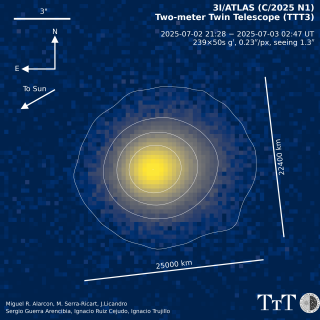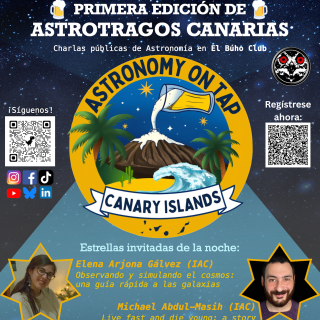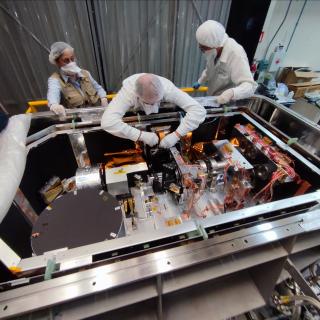It may interest you
-
 The Instituto de Astrofísica de Canarias (IAC) is actively participating in the observation of object 3I/ATLAS (C/2025 N1 ATLAS), initially included as A11pl3Z in the confirmed list of Near-Earth Objects (NEOs) of the International Astronomical Union's Minor Planet Centre (IAU/MPC). The object, which has been shown to be the third interstellar object detected in our solar system, was discovered by one of the telescopes in the ATLAS network for the detection and early warning of asteroids on an Earth-impact trajectory. The IAC is part of this network with its new telescope structure, ATLASAdvertised on
The Instituto de Astrofísica de Canarias (IAC) is actively participating in the observation of object 3I/ATLAS (C/2025 N1 ATLAS), initially included as A11pl3Z in the confirmed list of Near-Earth Objects (NEOs) of the International Astronomical Union's Minor Planet Centre (IAU/MPC). The object, which has been shown to be the third interstellar object detected in our solar system, was discovered by one of the telescopes in the ATLAS network for the detection and early warning of asteroids on an Earth-impact trajectory. The IAC is part of this network with its new telescope structure, ATLASAdvertised on -
 The Instituto de Astrofísica de Canarias (IAC) announces the arrival of the Astronomy on Tapinternational talk series in Spain, with its very first edition to be held in Tenerife. This outreach initiative, which was created in the United States and has since expanded worldwide, will now take place in the Canary Islands under the name "Astronomy on Tap – Canary Islands” and the local nickname “AstroTragos,” and is carried out within the framework of the EDUCADO and ExGal-Twin projects at IAC. The debut event will be held at the Búho Club (Calle Catedral, 3, La Laguna, Tenerife) on ThursdayAdvertised on
The Instituto de Astrofísica de Canarias (IAC) announces the arrival of the Astronomy on Tapinternational talk series in Spain, with its very first edition to be held in Tenerife. This outreach initiative, which was created in the United States and has since expanded worldwide, will now take place in the Canary Islands under the name "Astronomy on Tap – Canary Islands” and the local nickname “AstroTragos,” and is carried out within the framework of the EDUCADO and ExGal-Twin projects at IAC. The debut event will be held at the Búho Club (Calle Catedral, 3, La Laguna, Tenerife) on ThursdayAdvertised on -
 The Instituto de Astrofísica de Canarias (IAC) has successfully completed the integration of the scientific detector into the FRIDA (inFRared Imager and Dissector for Adaptive Optics) instrument, an integra-field camera and spectrograph designed to work with the adaptive optics system of the Gran Telescopio Canarias (GTC or Grantecan), the world's largest optical and infrared telescope, located at the Roque de los Muchachos Observatory in La Palma. The integration was carried out in the laboratories of the National Autonomous University of Mexico (UNAM) in Mexico City by a team from the IACAdvertised on
The Instituto de Astrofísica de Canarias (IAC) has successfully completed the integration of the scientific detector into the FRIDA (inFRared Imager and Dissector for Adaptive Optics) instrument, an integra-field camera and spectrograph designed to work with the adaptive optics system of the Gran Telescopio Canarias (GTC or Grantecan), the world's largest optical and infrared telescope, located at the Roque de los Muchachos Observatory in La Palma. The integration was carried out in the laboratories of the National Autonomous University of Mexico (UNAM) in Mexico City by a team from the IACAdvertised on
